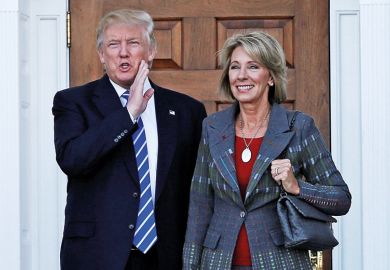The Trump administration, as part of its planned regulatory overhaul of US higher education, hopes to push all universities into accepting transfer credits earned at other institutions.
The idea is part of a package of proposals, largely aimed at boosting for-profit alternatives in higher education, that the administration is preparing to pursue at a formal rule-making session set to begin next week.
The administration has described its proposals, which also seek to boost religiously affiliated institutions, as an attempt to bring more fairness and equity to US higher education.
Too many providers are denying outside students a series of benefits, including credit transfer, “that should rightfully belong to all students attending institutions with recognised accreditation”, the Education Department said in explaining its approach. Its proposal would not directly force universities to accept all outside credits but would aim to forbid categorical denials.
The administration also hopes to prevent accrediting agencies from holding any religious college accountable for shortcomings attributable to its religious mission.
Federal agencies have broad authority to rewrite regulations as long as the terms do not violate existing laws. The Education Department has the power to force universities into compliance with its rules through its power to withhold federal student aid eligibility from institutions that do not comply.
Although there are few other limits on an administration’s rule-making authority, the writing process does require opportunities for public comment. The public deliberative phase of that process will begin on 14 January with dozens of open meetings – on topics of accreditation, online learning, educational innovation, faith-based institutions and teaching education grants – scheduled to last until late March.
The administration is nearing the completion of separate rule-making processes initiated last year on matters of sexual misconduct rules and educational outcomes requirements.
Key points of focus in the new round of rule-making are the accreditation agencies that evaluate the fitness of colleges and universities. Those accreditors are private, although they must win Education Department certification for their assessments to count towards federal student aid eligibility.
The administration has shown particular concern over the fact that most well-regarded US universities use one of the half-dozen “regional” accreditors handling the part of the country where their campuses are located.
For-profit colleges typically use newer “national” accreditors, which work without geographic restriction. Such national accreditors have been blamed for lax standards that failed to check a scandal of for-profit colleges luring low-income students into expensive courses that too often left them with high debts and insufficient job training.
The Trump administration has suggested that such problems are overblown and largely fixed, and it has complained that colleges with regional accreditation still unfairly penalise those with national accreditation, typically by refusing to accept transfer credits from them.
Some sector leaders with regional accreditation welcomed the administration’s desire to update accreditation standards to allow for more flexibility in teaching approaches and in evaluating educational outcomes. But even some leading innovators are worried.
Paul LeBlanc, the president of Southern New Hampshire University – who used online education to balloon SNHU’s 3,000-student enrolment to more than 100,000 – said that he does see many colleagues across higher education resisting changes that could hold them more accountable for overall student success.
At the same time, Dr LeBlanc said, the administration’s enthusiasm for for-profit colleges seemed insufficiently concerned with student protection. “If you don’t have transparency and clear outcomes,” he said, “you are making it very easy for bad players to sully the bigger effort.”
Register to continue
Why register?
- Registration is free and only takes a moment
- Once registered, you can read 3 articles a month
- Sign up for our newsletter
Subscribe
Or subscribe for unlimited access to:
- Unlimited access to news, views, insights & reviews
- Digital editions
- Digital access to THE’s university and college rankings analysis
Already registered or a current subscriber?








